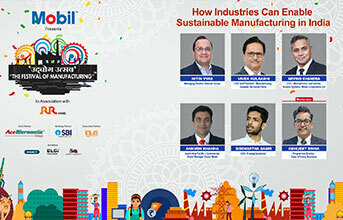
Manufacturing done in a way that minimises its adverse effects on the environment, conserves energy and natural resources, protects workers, communities, and consumers, and is also profitable is sustainable manufacturing. Manufacturers are becoming more aware of sustainable business practices' substantial economic and environmental advantages.
By using intelligent edge solutions to gather, analyse, and act on data across their organisation in close to real-time, manufacturers can lessen their environmental impact and find their path to sustainable production. This will increase efficiency, reduce waste, and help manufacturers find opportunities for sustainable innovation.
The panel discussion held on the topic ‘How Industries Can Enable Sustainable Manufacturing in India' in the Festival of Manufacturing began with open remarks by distinguished panellists.
In his opening remarks, Nitin Vyas, Managing Director, Beumer Group said, "Product in a silo is not sustainable unless a sustainable supply chain is integrated into the Manufacturing". He emphasised that looking for sustainability in manufacturing alone will not be enough but the entire product life cycle should be considered and even extended up to cradle to grave.
Arvind Chandra, CEO - Mechatronics and Vehicle Access Systems, Minda Corporation Ltd explained in his open remarks how the automotive industry has a lot of pressure on margins and how his organisation straddles both worlds of achieving the UN's Sustainable Development Goals(SDGs) as well as the Prime Minister's targets for sustainability in whatever they do. He said," Affordable sustainability in manufacturing is very important, We are taking a holistic approach and looking in areas where we can have affordable innovations".
Ankush Khanna, South Asia Pacific - Commercial Brand Manager, Exxon Mobil addressed how the increase in GDP of the nation increases the lifestyle demands of the people, which in turn automatically increases the energy requirements. He said," Energy is the requirement to sustain the lifestyles of the people but we need to be extremely careful and do a balancing act in providing energy to society at large and manage the sustainability ambitions".
The moderator of the panel Abhijeet Sinha, National Program Director, Ease of Doing Business took the discussion forward on how Sustainability can remain with the adoption of new technology in manufacturing as many in the industry generally do not consider the after-effects of their blind race to achieve what is best for their self.
The discussion shifted towards measuring the product and the carbon footprint it generates. Today's most prosperous manufacturing companies understand that being environmentally conscious not only benefits their bottom line but also plays a crucial role in how their products are advertised, bought, and used. It is crucial to take sustainability into account throughout the entire life cycle of manufactured goods. "Measuring needs to be done right from the procurement of raw materials, logistics, and packing," said Nitin Vyas. Arvind Chandra added, "The entire ecosystem from the validation of design through to taking it into manufacturing and then to the supplier ecosystem needs to be carefully measured to know the environmental output caused."
The development of fresh methods that utilise less toxic materials and produce fewer emissions, which may thus be deemed green processes, will be vital in addition to refining and optimising the present processes. Building capacity in the manufacturing sector is necessary to accomplish this as well as to measure and audit. The leaders in manufacturing must assume responsibility for this if others are to follow.
"We at Exxon have taken the responsibility to provide energy to the world in a responsible manner through various programs," Ankush Khanna remarked. Reduce, reuse, recycle, recover, redesign, remanufacture, repurpose, refurbish, and discard in addition to the 3Rs should be the makers' new priority in addition to the usage of renewable energy, predictive analysis and smart systems and automation.
Sustainable manufacturing is the most important aspect to be considered by all production engineers, not because it is a fad but a necessity as an obligation to the world we live in. "Every organisation needs to take small steps towards sustainability and environment as it is our responsibility towards our future generations," added Khanna.



























